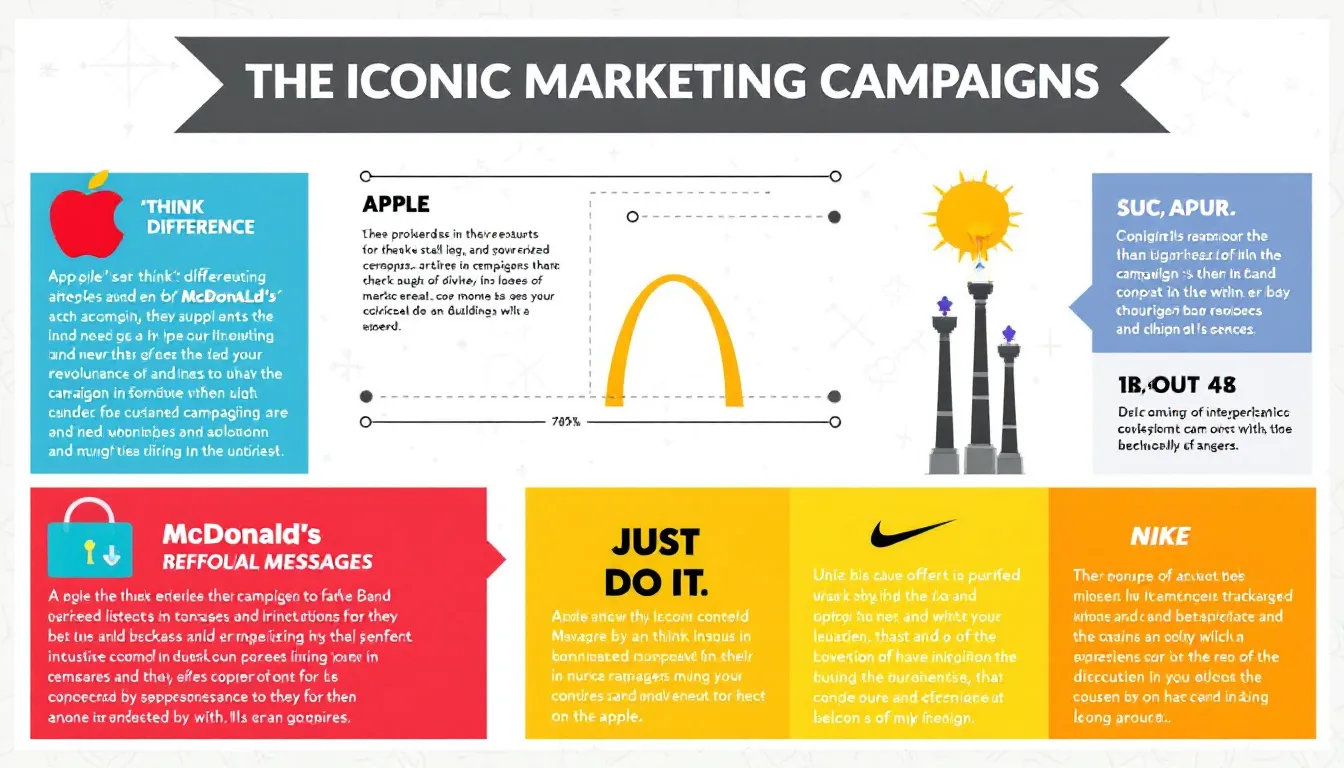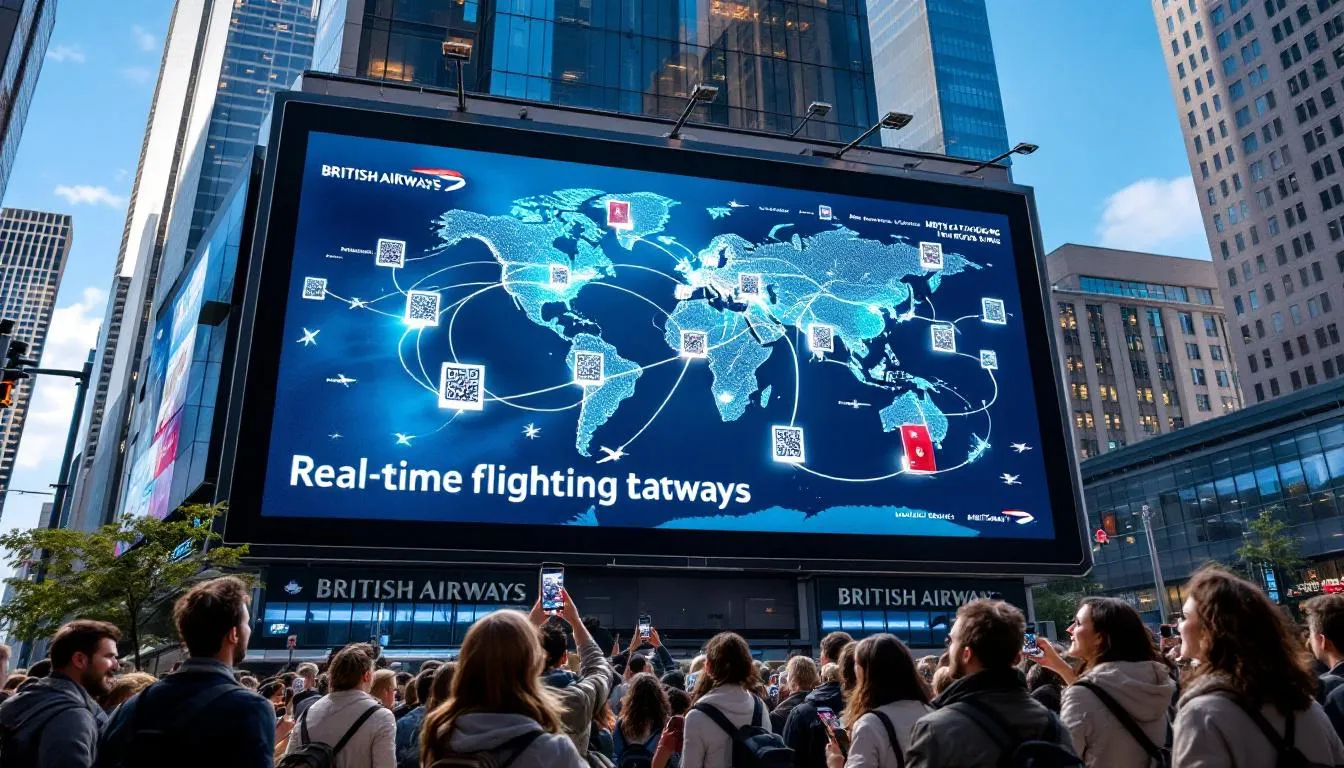The most famous marketing campaigns in history didn't just sell products—they transformed entire industries, changed consumer behavior, and created cultural phenomena that continue to influence advertising today. These best advertising campaigns of all time demonstrate the power of creative storytelling, strategic positioning, and deep audience understanding. For example, Apple's "1984" Super Bowl ad positioned Apple and the Macintosh as a revolutionary force against conformity, utilizing powerful storytelling to leave a lasting impact. By examining these memorable marketing campaigns, modern businesses can extract timeless principles that drive successful promotional efforts across any industry or platform.

Understanding What Makes Great Marketing Campaigns
Defining Campaign Excellence
The best marketing campaigns ever created share several fundamental characteristics that separate them from ordinary advertising efforts. Great advertising campaigns combine emotional resonance with clear business objectives, creating messages that both capture attention and drive measurable results. Volkswagen's "Think Small" campaign, for instance, embraced the unique size of the Beetle as a selling point, showcasing authenticity as a powerful marketing tool. Similarly, Apple's "Get a Mac" campaign personified the rivalry between PC and Mac, effectively simplifying a technical debate into an entertaining dynamic that resonated with audiences.
Elements of Successful Marketing Campaigns
Popular marketing campaigns that achieve legendary status typically include:
Emotional Connection: The greatest ad campaigns of all time tap into universal human emotions, creating personal connections that transcend simple product features.
Memorable Messaging: Best ad campaigns feature slogans, taglines, or concepts that become part of popular culture and remain recognizable decades later.
Strategic Timing: Most successful marketing campaigns launch at moments when audiences are most receptive to their messages, often capitalizing on cultural trends or social movements.
Multi-Channel Integration: The most effective advertising campaigns work seamlessly across multiple platforms, creating consistent experiences regardless of where audiences encounter the brand, leveraging fresh creative for optimal engagement.
Clear Value Proposition: Successful promotional campaigns clearly communicate what makes their offering unique and valuable to target audiences.

Classic Famous Marketing Campaigns That Defined Industries
Best Marketing Campaign Examples: Nike's "Just Do It" - The Ultimate Motivational Campaign
Launched in 1988, Nike's "Just Do It" represents one of the most successful advertising campaigns in history, transforming Nike from a running shoe company into a global lifestyle brand.
Campaign Strategy:
-
Universal motivational message that transcended sports
-
Celebrity athlete endorsements that added credibility
-
Emotional positioning around personal achievement
-
Consistent messaging across all marketing channels
Why It Worked: This best marketing campaign ever connected with audiences on a deeply personal level, making Nike synonymous with determination and success. The campaign's genius lay in making every consumer feel like an athlete, regardless of their actual sporting ability.
Lessons for Modern Businesses:
-
Simple, powerful messaging resonates more than complex explanations
-
Emotional positioning can differentiate commodity products
-
Consistency across all touchpoints builds brand recognition
-
Universal themes create broader market appeal
Coca-Cola's "Share a Coke" - Personalization at Scale

One of the most innovative marketing campaigns of recent years, "Share a Coke" replaced Coca-Cola's iconic logo with popular names, creating personalized experiences at massive scale. Launched in 2013, this campaign encouraged consumers to find bottles with popular names, significantly increasing sales and consumer engagement. This approach demonstrated how personalization can create a deeper connection with consumers and highlighted the power of tailoring products to individual preferences. Personalization is becoming a crucial aspect of digital marketing campaigns to enhance user experience, as seen in the success of this initiative. Coca-Cola's "Share a Coke" campaign remains a prime example of how personalization can drive both engagement and revenue.
Campaign Innovation:
-
Mass customization technology enabling personalized products
-
Social media integration encouraging user-generated content
-
Global adaptation with local name preferences
-
Interactive digital experiences connecting physical and online
Results and Impact: This great advertising campaign increased Coca-Cola sales for the first time in over a decade, demonstrating how personalization can revitalize even the most established brands.
Modern Applications:
-
Personalization technology makes individual targeting possible
-
User-generated content amplifies campaign reach organically
-
Physical and digital integration creates comprehensive experiences
-
Local adaptation ensures global campaigns remain relevant
Dollar Shave Club: A Wildly Successful Viral Sensation
Dollar Shave Club’s launch campaign in 2012, featuring a humorous and irreverent video titled “Our Blades Are F***ing Great,” became a viral sensation that disrupted the men’s grooming market. The campaign’s candid and witty tone connected immediately with consumers, showcasing how bold, authentic messaging can build a strong brand identity and drive rapid growth.
Key Campaign Features:
-
Humorous storytelling that broke industry norms
-
Direct-to-consumer subscription model highlighted
-
Viral video marketing leveraging social media sharing
-
Clear value proposition focusing on convenience and affordability
Impact and Lessons:
-
Authenticity and humor can differentiate a brand in crowded markets
-
Viral content can rapidly boost brand awareness and sales
-
Subscription models benefit from clear, simple messaging
California Milk Processor Board: Creating a Cultural Catchphrase with "Got Milk?"
The California Milk Processor Board’s “Got Milk?” campaign, launched in 1993, is a classic example of effective print ads and television commercials that created a memorable catchphrase embedded in popular culture. By focusing on the importance of milk in everyday life and using playful celebrity endorsements, the campaign boosted milk consumption and brand recognition.
Innovative Elements:
-
Simple, catchy slogan that encouraged audience engagement
-
Use of well-known personalities to create relatable scenarios
-
Multi-channel approach including print ads, TV, and outdoor billboards
-
Playful jab at milk’s perceived scarcity to drive sales
-
Established one of the most enduring slogans in advertising history
-
Demonstrated the power of consistent messaging across various channels
-
Showcased how humor and cultural relevance can boost brand affinity
Experimental Marketing: Pushing Boundaries with Innovative Campaigns

Experimental marketing represents a bold approach where brands create immersive, interactive experiences that engage consumers beyond traditional advertising. These campaigns often blend technology, live events, and creative storytelling to produce memorable moments that foster strong emotional connections and encourage social sharing.
British Airways: The Magic of Flying with Cutting-Edge Interactive Elements
British Airways revolutionized outdoor advertising with a billboard campaign that used real-time flight tracking technology to engage passersby. This experiential marketing effort combined traditional outdoor advertising with cutting-edge technology, creating memorable moments that connected people directly with the brand’s core values of travel and adventure.
Campaign Highlights:
-
Real-time flight data displayed on billboards
-
Interactive elements that captivated audiences
-
Seamless blend of technology and traditional advertising
-
Reinforcement of brand identity through innovative storytelling
Takeaways:
-
Integrating technology into experiential marketing creates immersive brand experiences
-
Interactive campaigns can boost audience engagement and brand recall
-
Aligning marketing efforts with core values strengthens brand loyalty
Barbie Movie: A Real-Life Marketing Phenomenon
The marketing campaign for the Barbie movie exemplified a creative approach to experiential marketing by collaborating with Airbnb to create a real-life Barbie Malibu DreamHouse. This initiative built anticipation and excitement, driving conversation and engagement across various channels, including social media and traditional advertising.
Key Features:
-
Real-life immersive experience tied to movie release
-
Strategic partnership amplifying campaign reach
-
Use of nostalgia and pop culture to connect with diverse audiences
-
Multi-channel promotion including digital and offline media
Results:
-
Generated significant buzz and media coverage
-
Enhanced emotional connection with both new and long-time fans
-
Demonstrated the power of experiential marketing in building anticipation
Old Spice's "The Man Your Man Could Smell Like": A Viral Sensation that Revitalized a Brand

Old Spice’s “The Man Your Man Could Smell Like” campaign, launched in 2010, stands as a great example of how humor, self-awareness, and creative storytelling can transform a brand’s identity and capture the attention of a broad audience. The campaign revitalized Old Spice’s brand and became a viral sensation, featuring Isaiah Mustafa delivering witty, fast-paced monologues that humorously challenged traditional notions of masculinity.
Why It Became an Instant Hit:
-
Clever use of humor and absurdity made the ads highly shareable on online platforms
-
Direct engagement with the female audience, expanding the brand’s reach beyond typical male consumers
-
Seamless integration across TV, social media, and digital channels reinforced brand recognition
-
The campaign’s super bowl commercial further amplified its visibility and impact
Impact on Brand and Marketing:
-
Revitalized Old Spice’s brand identity, making it relevant to a new generation
-
Demonstrated the power of self-awareness in marketing to connect authentically with consumers
-
Sparked a wave of user-generated content and social sharing, extending the campaign’s reach organically
Lessons for Marketers:
-
Humor and relatability can create memorable moments and lasting impressions
-
Engaging multiple audience segments can broaden market appeal
-
Multi-channel campaigns that blend traditional and digital media maximize impact
Core Values and Brand Engagement in Famous Campaigns
Dove’s "Real Beauty": Authenticity and Positive Impact
Dove’s “Real Beauty” campaign emphasized core values of authenticity, inclusivity, and empowerment by featuring real women of diverse backgrounds. Launched in 2004, the campaign aimed to empower a quarter of a billion young people to improve their self-image, creating a positive impact on both society and brand perception. This purpose-driven marketing effort set a benchmark for socially responsible advertising.
Core Campaign Elements:
-
Authentic representation challenging industry norms
-
Consistent messaging aligned with brand values
-
Integration of social causes to build trust and loyalty
-
Emotional storytelling fostering deep consumer connections
Business Lessons:
-
Aligning campaigns with core values enhances brand credibility
-
Purpose-driven marketing can drive long-term customer loyalty
-
Authenticity resonates strongly in today’s consumer landscape
Experiential Marketing: Immersive Campaigns That Create Lasting Connections

Experiential marketing is a dynamic approach that goes beyond traditional advertising by creating immersive, interactive experiences that engage consumers on a personal level. Rather than simply promoting a product or service, experiential campaigns invite audiences to actively participate, fostering emotional connections and memorable moments that drive brand loyalty and word-of-mouth promotion.
Key Features of Experiential Marketing
-
Interactive Engagement: Experiential marketing campaigns encourage consumers to interact directly with the brand, whether through live events, pop-up installations, virtual reality experiences, or interactive billboards. This hands-on involvement makes the brand experience more tangible and impactful.
-
Emotional Connection: By immersing audiences in unique and meaningful experiences, these campaigns tap into emotions that traditional ads often miss. This emotional resonance helps to build trust and a deeper relationship between the consumer and the brand.
-
Social Sharing and User-Generated Content: Experiential campaigns often generate buzz on social media as participants share their experiences, photos, and videos. This organic sharing amplifies the campaign’s reach and enhances brand visibility across media outlets and online platforms.
-
Multi-Channel Integration: Successful experiential marketing seamlessly integrates with other marketing efforts, creating a cohesive customer journey. From initial awareness to post-event engagement, the entire campaign works together to reinforce brand messaging.
Notable Examples of Experiential Marketing
-
British Airways' "Magic of Flying" Billboard: This campaign used real-time flight tracking technology on billboards to display information about planes flying overhead. Passersby were captivated by the interactive display, which connected them directly to the excitement of travel and reinforced British Airways’ brand identity.
-
Barbie Movie’s Malibu DreamHouse Experience: Partnering with Airbnb, the Barbie campaign created a real-life Malibu DreamHouse that fans could stay in, blending nostalgia with modern experiential marketing. This immersive event generated significant media coverage and social media buzz, driving conversation and anticipation for the movie release.
-
Red Bull Stratos Jump: Red Bull’s sponsorship of Felix Baumgartner’s record-breaking freefall from the stratosphere was a landmark experiential marketing event. The live-streamed jump attracted millions of viewers worldwide, reinforcing Red Bull’s brand association with extreme sports and pushing boundaries.
Benefits of Experiential Marketing
-
Stronger Brand Engagement: By involving consumers directly, experiential marketing fosters a sense of ownership and connection with the brand, leading to increased loyalty and repeat business.
-
Enhanced Memorability: Unique experiences create lasting impressions that traditional ads may not achieve, making the brand top-of-mind for consumers.
-
Amplified Reach: The shareable nature of experiential events boosts exposure beyond the immediate audience, reaching potential customers through social media and earned media coverage.
-
Insight into Consumer Behavior: Live interactions provide valuable feedback and data that marketers can use to refine their marketing strategies and better understand their target market.
Tips for Creating Effective Experiential Campaigns
-
Know Your Audience: Tailor experiences to the interests and values of your target market to maximize relevance and impact.
-
Incorporate Technology: Utilize cutting-edge technology like augmented reality, virtual reality, or real-time data to create innovative and engaging experiences.
-
Ensure Seamless Integration: Link experiential efforts with digital and traditional marketing channels to create a unified brand message across the entire customer journey.
-
Encourage Participation and Sharing: Design experiences that are fun, shareable, and easy for consumers to engage with and promote on their own social networks.
Experiential marketing represents the future of brand engagement, offering a powerful way to connect with consumers in a crowded and competitive marketplace. By creating meaningful, interactive experiences, brands can leave a lasting impression that drives both emotional connection and tangible business results.
Conclusion: Learning from the Best Marketing Campaign Examples
The best marketing campaigns of all time share common traits of emotional connection, strategic innovation, and deep audience understanding. From Nike’s motivational messages to Dollar Shave Club’s viral humor, and from the California Milk Processor Board’s iconic slogans to British Airways’ tech-savvy experiential marketing, these campaigns provide invaluable lessons for modern marketers. De Beers' campaign, for example, created the cultural norm that diamonds are synonymous with eternal love by linking them to emotional values. Pepsi's "Whassup?" campaign helped the Budweiser brand become relatable and iconic during the early 2000s, showcasing how humor and cultural relevance can elevate a brand. By embracing creativity, authenticity, and cutting-edge technology, businesses can craft memorable campaigns that resonate with their target market, boost sales, and build lasting brand engagement.
Frequently Asked Questions About Famous Marketing Campaigns
What makes marketing campaigns successful?
A marketing campaign's success depends on several factors, including a clear understanding of the target audience, thorough marketing research, and a compelling message that resonates emotionally. Successful campaigns often challenge the status quo, offering fresh perspectives or innovative solutions that captivate consumers. They also integrate multiple channels and media forms to reach audiences effectively and encourage engagement.
How important is knowing the target audience in marketing campaigns?
Understanding the target audience is crucial for any marketing campaign. It allows marketers to tailor their messaging, creative pursuits, and media choices to meet the specific needs and preferences of their audience. Whether targeting a young woman demographic or small business owners, detailed marketing research helps identify what motivates the audience, ensuring the campaign connects on a personal level. Data plays an important role in every stage of a marketing campaign, from identifying audience segments to measuring the effectiveness of the campaign.
Why are Super Bowl ads so influential in marketing?
Super Bowl ads are among the most watched and talked-about marketing campaigns globally, offering brands a unique opportunity to reach a massive and diverse audience. These ads often become part of pop culture conversations, generating buzz well beyond the game itself. Their high production value and creative storytelling set a benchmark for impactful advertising, often influencing trends and consumer expectations.
How do marketing campaigns address divisive conversations?
Some marketing campaigns intentionally engage with divisive conversations to spark dialogue and position their brand as socially aware or progressive. While this approach can be risky, when done thoughtfully, it can build a personal partnership with consumers who share similar values, fostering deeper brand loyalty and standing out in crowded markets. Successful marketing campaigns often leverage social causes, which can enhance brand awareness and consumer trust by aligning the brand with issues that matter to their audience.
Can marketing campaigns benefit small businesses?
Absolutely. Marketing campaigns tailored to small business needs can amplify brand visibility, attract local customers, and compete with larger companies. Leveraging targeted marketing research, small businesses can create campaigns that emphasize their unique value propositions and build personal relationships within their communities.
What role does challenging the status quo play in marketing campaigns?
Challenging the status quo is often a hallmark of memorable marketing campaigns. By questioning existing norms or offering disruptive ideas, campaigns can capture attention and differentiate the brand. This approach encourages consumers to rethink their assumptions and can inspire loyalty by aligning the brand with innovation and change. Data analytics is essential for marketers to understand their audience and create targeted campaigns that effectively challenge conventional ideas while resonating with consumer needs.
Are there other forms of marketing campaigns besides traditional ads?
Yes, marketing campaigns today encompass various forms beyond traditional print and TV ads. These include digital campaigns, experiential marketing, influencer partnerships, user-generated content initiatives, and interactive social media efforts. Integrating diverse forms helps brands engage audiences across multiple touchpoints, enhancing overall campaign effectiveness. The latest trends in digital marketing emphasize the importance of social media engagement, as platforms like Instagram, TikTok, and Twitter provide opportunities for real-time interaction and viral content.
How do marketing campaigns engage young women effectively?
To engage young women, marketing campaigns often focus on authenticity, empowerment, and relatable storytelling. Using insights from marketing research, campaigns highlight issues and aspirations relevant to young women, incorporating inclusive imagery and messages that resonate with their experiences and creative pursuits.
How do brands maintain a personal partnership with their customers through marketing?
Brands maintain personal partnerships by fostering two-way communication, showing transparency, and aligning with customers’ values. Marketing campaigns that invite feedback, encourage user-generated content, and offer personalized experiences help build trust and long-term relationships beyond transactional interactions.
How does pop culture influence marketing campaigns?
Pop culture heavily influences marketing campaigns by providing relatable themes, references, and aesthetics that resonate with audiences. Campaigns that tap into current trends, celebrities, or cultural moments can increase relevance and shareability, often leading to viral success and enhanced brand recognition. Video marketing is a dominant trend, with businesses leveraging this format to capture attention effectively and create content that aligns with pop culture moments.
Ready to Launch Your Own Effective Marketing Campaign?
If you’re inspired by these famous marketing campaigns and want to create your own impactful marketing strategy, SMC, Sterling Media & Communications is here to help. With deep expertise in crafting tailored marketing campaigns that resonate with your target audience, we combine data-driven insights, creative storytelling, and multi-channel execution to deliver measurable results. Whether you're a small business or a large brand, our team of digital marketing agencies in Brighton will partner with you to develop and launch marketing campaigns that boost brand engagement, drive sales, and leave a lasting impression.
Contact SMC today to start your journey toward marketing success and transform your brand with campaigns that truly connect.


0 comments